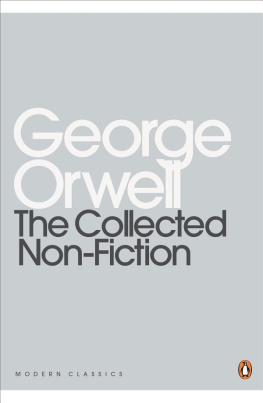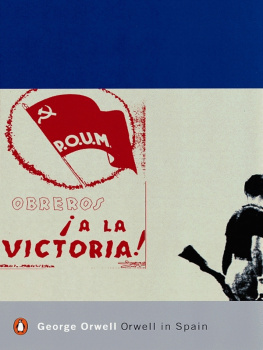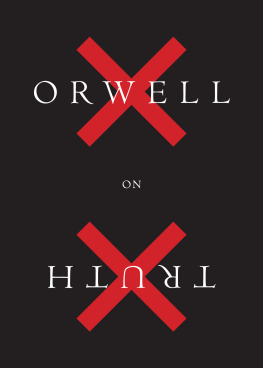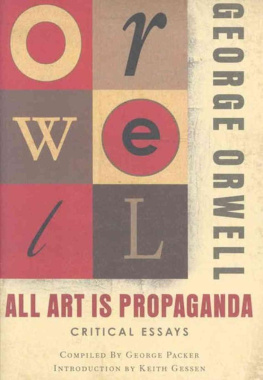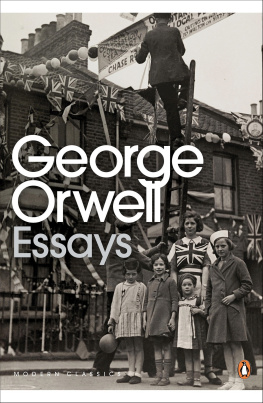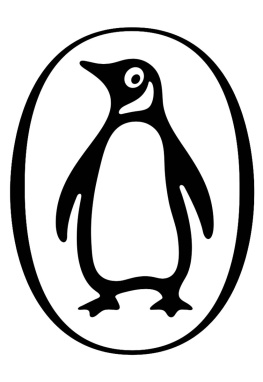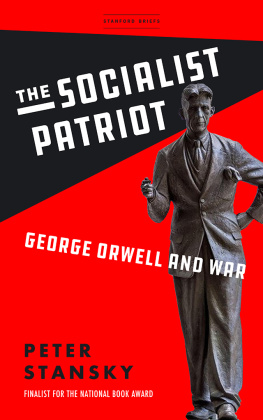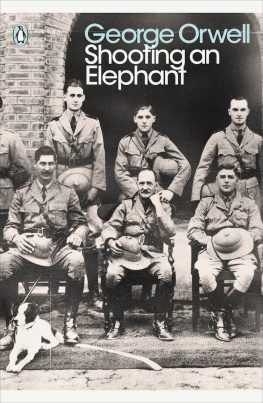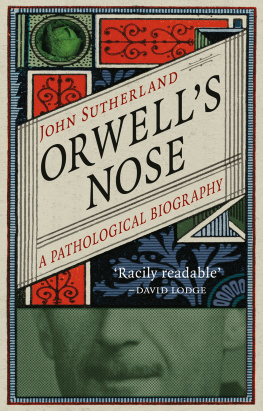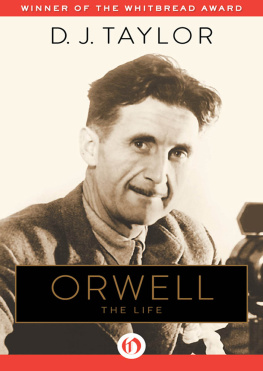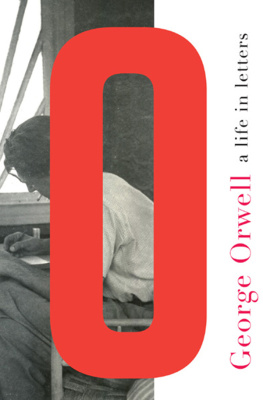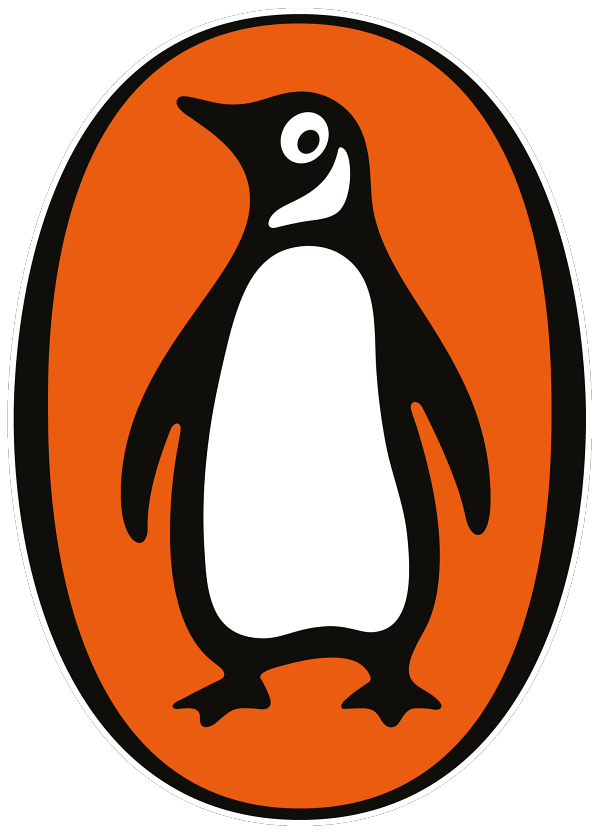George Orwell
THE COLLECTED NON-FICTION
A Kind of Compulsion (19031936)
Facing Unpleasant Facts (19371939)
A Patriot After All (19401941)
All Propaganda is Lies (19411942)
Keeping Our Little Corner Clean (19421943)
Two Wasted Years (1943)
I have Tried to Tell the Truth (19431944)
I Belong to the Left (1945)
Smothered Under Journalism (1946)
It is What I Think (19471948)
Our Job is to Make Life Worth Living (19491950)
Edited by Peter Davison
Assisted by Ian Angus and Sheila Davison
ABOUT THE BOOK
The first eleven titles in this edition were originally published as volumes 10-20 in The Complete Works of George Orwell (1986-1998), edited by Peter Davison. The Lost Orwell was first published as a supplementary text in 2006.
This authoritative edition incorporates all Orwells known essays, poems, plays, letters, journalism, broadcasts, and diaries, and also letters by his wife, Eileen, and members of his family. In addition there are very many of the letters in newspapers and magazines of readers reactions to Orwells articles and reviews. Where the hands of others have intervened, Orwells original intentions have been restored.
ABOUT THE AUTHOR
Eric Arthur Blair better known as George Orwell was born on 25 June 1903 in Bengal, India, where his father worked for the Civil Service. The family moved to England in 1907 and in 1917 Orwell went to Eton. From 1922 to 1927 he served with the Indian Imperial Police in Burma, an experience that inspired his first novel, Burmese Days (1934). Several years of poverty followed. He lived in Paris for two years, and then returned to England where he worked as a private tutor, schoolteacher and bookshop assistant. Down and Out in Paris and London was published in 1933. In 1936 he was commissioned by the publisher Victor Gollancz to visit areas of mass unemployment in Lancashire and Yorkshire, and The Road to Wigan Pier is a powerful description of the poverty he saw there. At the end of 1935 Orwell went to Spain to fight for the Republicans and was wounded in the throat. Homage to Catalonia is his account of the civil war. He was admitted to a sanatorium in 1938 and from then on was never fully fit. He spent six months in Morocco and there wrote Coming Up for Air. During the Second World War he served in the Home Guard and worked for the BBC Eastern Service from 1941 to 1943. He joined Tribune as its literary editor and also wrote for the Observer and Manchester Evening News. His unique political allegory, Animal Farm, was published in 1945, and it was this novel, together with Nineteen Eighty-Four (1949), which brought him world-wide fame. Orwell died in London in January 1950.
Peter Davison left school when he was fifteen and worked in a variety of jobs, which included stints at the Crown Film Unit, MGM and the International Wool Secretariat, as well as in the Royal Navy during the Second World War. He began studying in his spare time and obtained an English degree in 1954 and subsequently a PhD from Sydney University. From 1964 to 1972 he was a Fellow at the Shakespeare Institute, Birmingham University, editing for the Penguin Shakespeare series in the 1960s 1 and 2 Henry IV, editions that are still in print. He was then Professor of English at St Davids University College, the University of Kent and De Montfort University, Leicester. Whilst managing a historic building in London he edited Orwells Complete Works. He edited the Bibliographical Societys journal for twelve years and was awarded the Societys Gold Medal. He was appointed D. Lit and Hon. D. Arts in 1999 and awarded the OBE for services to literature.
From 1961 Ian Angus was Deputy Librarian and Keeper of the Orwell Archive at University College, London, and from 1975 Librarian of Kings College, London. With Sonia Orwell he co-edited the Collected Essays, Journalism and Letters of George Orwell (4 vols., 1986).
Sheila Davison was a teacher until she retired, for some time teaching the deaf. She checked and proofread all twenty volumes of the complete edition and assisted with the research and indexing.
WORKS BY GEORGE ORWELL
Down and Out in Paris and London
Burmese Days
A Clergymans Daughter
Keep the Aspidistra Flying
The Road to Wigan Pier
Homage to Catalonia
Coming Up for Air
Animal Farm
Nineteen Eighty-Four
A Kind of Compulsion (190336)
Facing Unpleasant Facts (193739)
A Patriot After All (194041)
All Propaganda is Lies (194142)
Keeping Our Little Corner Clean (194243)
Two Wasted Years (1943)
I Have Tried to Tell the Truth (194344)
I Belong to the Left (1945)
Smothered Under Journalism (1946)
It is What I Think (194748)
Our Job is to Make Life Worth Living (194950)
General Introduction
ANYTHING ABOUT ORWELL IS INTERESTING. He was a man, like Lawrence, whose personality shines out in everything he said or wrote. So Cyril Connolly in 1962. forty years ago:
The chief difficulty of writing a book nowadays is that pots of paste are usually sold without brushes. But if you can get hold of a brush... and a pair of scissors and a good-sized blank book, you have everything you need. It is not necessary to do any actual writing. Any collection of scrapsreprinted newspaper articles, private letters, fragments of diaries, even radio
Todays public is hardly amusement-starved and there are improvements on stiff-brushed pots of Gloy, but to bring together all that Orwell wrote that has survived requires more than glue, scissors and even several good-sized blank books. It also demands a great deal of writing and explication. No editor would approach this task without believing as did Connolly, yet aware simultaneously of Orwells doubts. Why try to reconcile this conflict?
One of the most interesting and percipient articles about Orwell, and one little known, is that by Nicolas Walter in Anarchy: A Journal of Anarchist Ideas published some thirty-six years ago. He writes of Orwells sense of compassion War, and the post-war Labour Government illuminate his writing and his writing gives those events a renewed significance and force.
George Orwell was born Eric Arthur Blair on 25 June 1903 at Motihari, Bengal. His father, Richard Walmesley Blair, was a sub-deputy agent in the Opium Department of the Indian Civil Service; his mother, Ida Mabel Blair, though born in England, was the daughter of Frank Limouzin, a teak merchant of French extraction in Moulmein, Burma. Richard Blair was born in 1857, the son of the vicar of Milborne St Andrew, Dorset. His wife, Ida, was born in 1875. When Orwell was born they already had one daughter, Marjorie Frances, born at Gaya, Bengal on 21 April 1898. A second daughter, Avril Nora, was born at Henley-on-Thames on 6 April 1908. Ida returned to England with the two children in 1904. Orwells father came home for three months in the summer of 1907 and then returned to India when his leave was over. Orwell did not see his father again until he retired from the Opium Department in January 1912. The children were educated first at an Anglican convent school. In September 1911, Orwell went to St Cyprians private preparatory school at Eastbourne, and, after a term at Wellington in 1917, he took up a Kings Scholarship at Eton in May of that year. A Chronology will be found in the preliminaries to each volume, but the letters, articles, diaries, reviews, broadcasts (and, indeed, the annotations) take up the story of Orwells life very fully from this time at his prep school until his death on 21 January 1950 at the age of forty-six.

